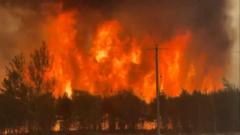As wildfires rage across Canada, military aircraft transport evacuees from affected communities in Manitoba. The already alarming situation is compounded by extreme weather forecasts, leaving vast areas under air quality advisories in both Canada and the US.
Canada Faces Dire Wildfire Crisis as Military Executes Evacuations

Canada Faces Dire Wildfire Crisis as Military Executes Evacuations
Evacuations escalate in Manitoba amid worsening wildfire conditions, prompting military assistance and air quality alerts across North America.
Military aircraft and helicopters are actively engaged in evacuating residents from Canadian provinces affected by rapidly spreading wildfires, particularly in Manitoba. As the flames advance, over 2,000 people from the northern community of Pukatawagan are urgently needing transport to safety amid escalating conditions. The Canadian Armed Forces, working alongside provincial wildfire services, are facing a challenging firefighting environment, with more than 180 wildfires reported nationwide and many categorized as out of control.
Large evacuations have started not only in Manitoba but also in neighboring Saskatchewan and British Columbia, as authorities declare states of emergency in response to the extreme fire conditions. Manitoba's environment is severely affected, with reports of 25 active fires within the province alone. The premier has highlighted that all regions in Manitoba are currently battling flames simultaneously, with no sign of respite predicted.
Meteorological conditions are worsening, with projections indicating a cold front's arrival will fail to alleviate the dire situation, instead bringing shifting winds that may exacerbate fire spread. This hazardous weather has implications for air quality as well, impacting millions in the United States, particularly those in nearby Michigan and Wisconsin, where advisories for unhealthy air quality have been issued.
The year 2023 has marked a record for wildfires across Canada, with over 42 million acres burned, and scientists attribute the escalating frequency and intensity of such disasters to climate change. The current crisis serves as a stark reminder of the pressing need for international collaboration in combating wildfires and addressing climate change's pervasive effects on weather patterns. With the situation evolving, communities and agencies continue to navigate the complexities of fire management and emergency relocation efforts.





















